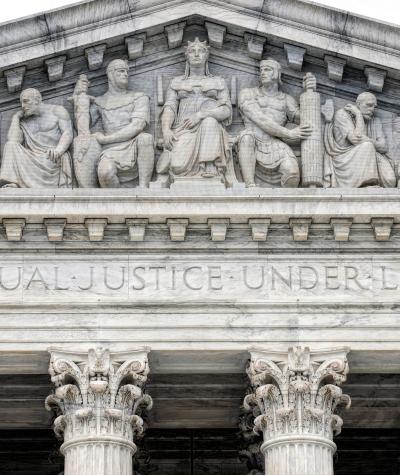Update:
On June 27, the Supreme Court issued a ruling in this case drastically expanding presidential power. The Supreme Court has kicked the can down the road in deciding whether the President's attempt to end birthright citizenship is constitutional, but in doing so threw up new road blocks to immediately halting unconstitutional executive actions.
The Supreme Court has essentially kneecapped lower courts from stopping this administration and any future administration when they engage in lawless and unconstitutional behavior. Read more about the implications of this ruling.
Supreme Court Case on Birthright Citizenship
If you are born in the United States, the Constitution clearly guarantees that you are a citizen with all the freedoms that entails. Citizenship unlocks the door to democratic participation and the promise of an inclusive America — from ensuring the fundamental freedom to vote in federal elections to running for office.
But the president is attempting to gut this principle through an unlawful executive order.
The U.S. Supreme Court recently heard early arguments challenging rulings issued by three lower courts that blocked the president’s efforts to overturn the Constitution’s guarantee of birthright citizenship. That constitutional guarantee determines who makes up the electorate and who may participate in our democracy.
Campaign Legal Center is urging courts to protect the uniquely American principle of birthright citizenship, which is the foundation of democratic equality and equal access to the freedom to vote.
Why Does This Case Matter?
President Trump’s attacks on birthright citizenship are a threat to our democracy. His executive order is unconstitutional and undermines over 100 years of Supreme Court precedent.
On January 20, 2025, President Trump issued an executive order attempting to illegally end birthright citizenship. The order would apply to individuals born to parents who are in the country without authorization or who hold work, student or tourist visas.
This executive order could render millions of American-born children effectively stateless, meaning that they wouldn’t be recognized as a citizen of any country and would lack essential rights, including the right to participate in their own democracy.
Birthright Citizenship Is a Cornerstone of Our Democracy, and It Cannot Be Undone by the President.
Following the Civil War, Congress passed several amendments, including the 14th Amendment, which establishes birthright citizenship. The 14th Amendment states, “All persons born or naturalized in the United States, and subject to the jurisdiction thereof, are citizens of the United States and of the State wherein they reside.”
The 14th Amendment ensures that who gets to participate in our democracy cannot be redefined by political motives. It updated the Constitution so judges and politicians could never again have the power to deny citizenship to any group of individuals born within the United States.
However, President Trump is singlehandedly trying to reshape the country’s electorate through his unconstitutional actions.
This is not the first time the Supreme Court has dealt with challenges to birthright citizenship. In the 1898 case United States v. Wong Kim Ark, the court affirmed that the 14th Amendment guarantees citizenship for individuals born in the United States, even if their parents are not citizens.
The 14th Amendment and more than a century of Supreme Court precedent are clear: Children born in the United States are granted citizenship — no matter who their parents are.
How Do Amendments Get Repealed?
Constitutional amendments cannot be repealed by executive order. Only a combined effort between Congress and state legislatures can repeal an amendment and, even then, the process is long and complicated. Repealing an amendment requires a two-thirds majority in Congress and a three-fourths majority of ratification by the states.
This separation of powers is designed to ensure that no one branch — including the executive branch — can exert total control and singlehandedly rewrite the Constitution. Not only does the president have no power to strip citizenship rights from American-born individuals, his attempt to do so is an insult to our constitutional tradition.
Citizenship based solely on place of birth opens democratic participation to all and rejects the fundamentally undemocratic concept of citizenship based on race, class, heritage or parental immigration status.
For the president to say he will unilaterally deny citizenship to certain people born in the country is incredibly troubling, both as a matter of law and also because of what it means for democratic participation.
If the president has the right to determine who is and who is not a citizen, then the president also can decide who can and who cannot vote — and that is a very dangerous precedent.
Why Is Trump Trying to End Birthright Citizenship?
Attacks on citizenship are attacks on our democracy. From trying to upend the electorate by eradicating birthright citizenship to signing an executive order that would then require difficult-to-obtain citizenship documentation, President Trump is attacking the freedom to vote.
These are not attempts to secure our elections. These are attempts to silence American voices.
Birthright citizenship is the law of the land. That’s why Campaign Legal Center has urged courts to reject Trump’s unconstitutional order in briefs submitted to the 1st U.S. Circuit of Appeals, the 4th U.S. Circuit of Appeals and the 9th U.S. Circuit of Appeals on behalf of Secure Families Initiative.
As the litigation challenging Trump’s order continues to move forward in courts throughout the country and up to the U.S. Supreme Court, Campaign Legal Center will continue to fight to protect equal citizenship rights for all.
Campaign Legal Center is urging the Supreme Court to affirm our Constitution and more than 100 years of legal precedent by upholding birthright citizenship. With your help, we can continue to move towards a democracy that works for all Americans.


